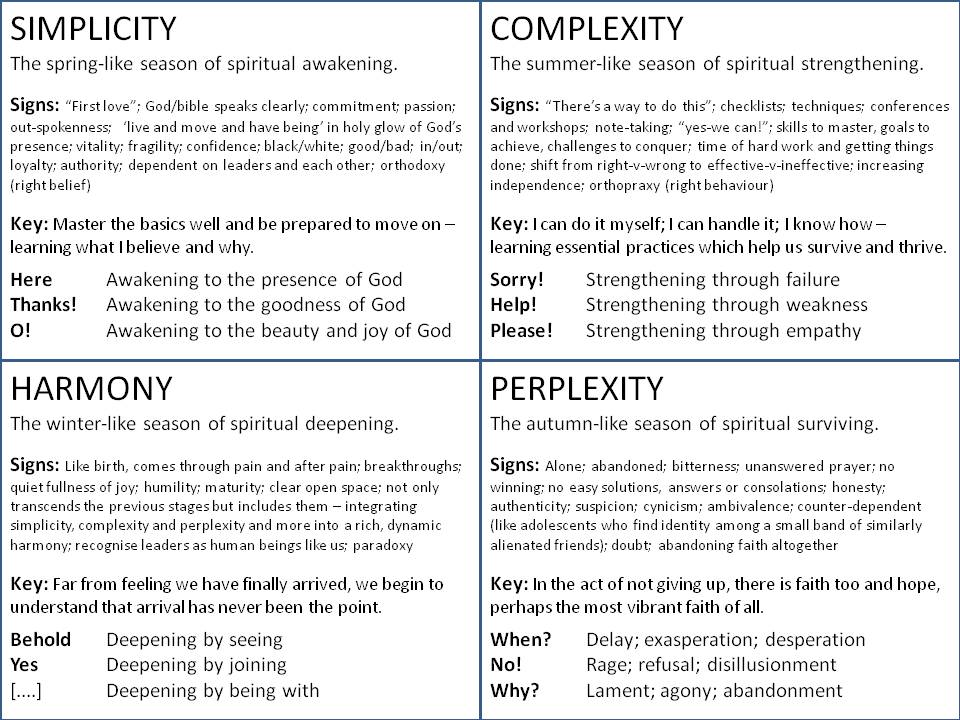O!: The practice of Worship and Awe:
Awakening to the Beauty and Joy of God
Alternative words: Hallelujah! Glory!
Amen! How....
Starting point: “If our first simple work awakens us to the
presence of God and the second to the
presents or gifts of God, our third
simple word awakens us to the heart of God which is – consider this –
characterised by an essential, unconquerable, boundless, radiant, wonderful,
infinite, exuberant, generous, glorious joy.” (p82-3)
“I have worshiped in the world’s
great cathedrals, and I love the grandeur, glory, reverence, dignity and
history....but these [African church] tin roofs, these dirt floors, these
smells of sweat and cooking fires, these animating rhythms and swaying bodies
and resonant voices...these mark for me worship at its most sublime....Why are
the most blessed often the most restrained in their worship, and why are those
who have least in terms of health, wealth and safety the most ready to ‘make a
joyful noise and sing for joy to the Lord’?” (p81)
On the way:
·
“Could it be that our accumulation of
possessions and protections coat our souls like rubber gloves so that we touch,
but do not feel?” (p81)
·
“Could it be that the conceptualised and
formalised worship of the ‘developed world’ is actually designed to inhibit and
control rather than foment joy?” (p81)
·
Worship creates Temporary Autonomous Zones
(Kester Brewin), places where normal patterns of hegemony (dominance of one group/culture over others) and homogeneity (making all things the same) are broken.. Holy-days. “when we transcend normal patterns....and
get a tiny taste of the way life is supposed to be”
·
God is joyful – “when we connect with God, it is
as if we are plugging our souls into a pure current of high-voltage joy.....God
is a joyful being and to enter or awaken to God’s presence is to enjoy a
bracing jolt of invigorating delight followed by increasing levels of unending
pleasure...God’s joy is contagious” (p83)
·
“To worship is to exercise the highest
capacities we have” (p89) – suggestion that this might involve connecting left
(analytical) and right (feeling) sides of brain? “Explanation gives way to exclamation, reasoned
answer to rhetorical question” (cf Paul in Romans 11 – p 93-94). But also the
type of God we worship might actually affect our brain/how we think? (p88)
Walking with scripture: Psalm 95: 1,6; Psalm 94:3; 1 John 1:5;
4:7-21. When human beings enter into the
joyful celebration of the glory of God and the goodness of God’s gift of
life...people don’t simply become more religious – they become more alive – Ps 28:7,
Ps 150. Romans 11:33-36.
Moving on: “Worship translates naturally and immediately into a way of life, life
lived not for self-interest...but for the common good” (see Paul in Galatians 5
– p94) “.. the tsunami of God’s grace inspires us to express our worship not
simply in religious activities, but in real life, through love for one another”
(p95)
Pointers for prayer:
1. Give God the first greeting every morning
2. Give God the first thanks at every meal
3. Give God the first response to every
pleasure
4. Give God the first consideration in your
weekly schedule
5. Make God the first supervisor or customer
for all work
6. Give God the first part of every pay cheque
7. Give God the joy of your creativity
SUMMARISED FROM 'NAKED SPIRITUALITY' BY BRIAN D. McCLAREN (HODDER AND STOUGHTON, 2010) - this summary produced by Jane Perry Mar 2012
SUMMARISED FROM 'NAKED SPIRITUALITY' BY BRIAN D. McCLAREN (HODDER AND STOUGHTON, 2010) - this summary produced by Jane Perry Mar 2012
